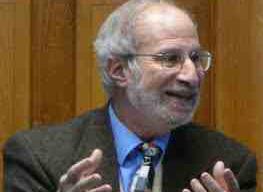By Dr. Joseph Chuman

We are living in extraordinary times—to say the least. It is a time that causes us to dig deeper to unearth our emotional resources in order to cope. I suspect all of us have friends, family members, acquaintances, who have contracted the coronavirus. Some may know people who, tragically, have died from it. And I know a few members who have themselves suffered through the discomforts and fears wrought by the illness. It feels as if the monster is looming at the gate, circling and moving closer.
Our lives out of necessity have become abnormal. Our routines have been totally disrupted. We are forced to “socially distance,” but being kept apart runs against our nature as social beings. Plus, we are faced with the ambiguity and anxiety as to when this plague will end. In the impulse to get beyond it and restore normalcy, and propelled by severe economic pressure, too many places are opening too early, I fear. The virus continues to lurk. It is aggressive and all that is needed is one infected person in the midst of a crowd and the disease resurges.
For those of us who are politically attuned (and who among us isn’t?) there is a second plague that darkens our landscape. In times of national emergency, people naturally look to national leadership. Inspired leaders provide order, give people hope, and bring comfort. I do not need to go on with specifics about the leadership emerging from the White House. I have done it many times before and this is not the time for a rant. Let’s just say that our president is not up to the requirements of the office and the demands of the moment.
Pandemic highlights economic, racial divisions
But beyond these concerns lurks the issue of the major economic, social, and political dysfunctions that the pandemic has brought to the surface and revealed. As noted many times, before the coronavirus outbreak, 40 percent of Americans had trouble meeting their monthly bills. And now they have fallen over the edge. Unemployment is surging—and with no job, there’s no health care. The pandemic has brought into starker relief the economic and racial divisions in America that run deep. To meet the emergency, the United States had to seek humanitarian aid from Russia, China, and the United Nations.
The journalist George Packer has an excellent article in “The Atlantic” magazine this month, asserting that the United States, the world’s richest country, is a failed state; our response to the emergency more akin to what we would expect from Belarus or Pakistan than a great nation. Packer doesn’t necessarily say anything new. But he does say it with great power. I commend the article.
There is another side to this story and this is where we need to focus our attention. I gave an address recently on how out of emergencies good things can happen. And I mean it. It is the story of how people such as you and I at the grass roots have risen to the occasion. It is the story of how nurses and other workers, under unspeakably demanding conditions, have put their lives on the line to save others. It is how transit workers, grocery clerks, sanitation people, firemen, police officers, and other workers, newly found essential, have gone to work and incurred a risk that the rest of us, the more privileged, can avoid by staying home. It is the story of people heading to their sewing machines to make masks for those on the front lines. And it is the story of local leaders who have guided their communities and institutions to do the right thing, filling the vacuum created by the dereliction, incompetence, and venal self-interest at the very top that has resulted in the unnecessary deaths of tens of thousands.
Modeling what democracy should look like
These are the people who model what democracy, our democracy, should look like. Democracy is not just voting every four years. It is the exercise of giving to the community, of harnessing our civic commitment for the sake of others and the common good. It is this spirit that needs to inspire us and that we need to employ to rebuild our country and achieve the country we all deserve.
Spring is here. We need to turn inward to marshal our own resources in order to cope. But we also need to turn outward to each other and attain the strength we derive from the human bond. Our Ethical Society is one of the grass-roots communities that is doing this, and from my standpoint we are doing it very well. Our democratic commitments, our manifestations as a caring community have never been more in evidence.
Throughout the summer we need this to continue. I am sure it will, and I look forward to being with you. Despite the unique challenges you and I confront, I hope it is nevertheless a good summer. Through difficulties the best that is in us will be revealed.
Dr. Joseph Chuman is leader of the Ethical Culture Society of Bergen County.


